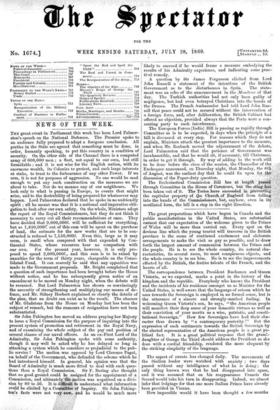NEWS OF THE WEEK.
THE great event in Parliament this week has been Lord Palmer- ston's speech on the National Defences. The Premier spoke to
an audience fully prepared to adopt a foregone conclusion. All parties in the State are agreed that something must be done, in order, humanly speaking, to put this country in a condition of security. On the other side of the Channel there is a computed army of 600,000 men ; a fleet, not equal to our own, but still formidable ; and it is not wise for the English nation, with its enormous wealth, its Colonies to protect, and such large interests at stake, to trust to the forbearance of any other Power. If we arm, it is not for purposes of aggression. No one would be mad enough to put any such construction on the measures we are about to take. Nor do we menace any of our neighbours. We look only to what is passing in Europe, to events that might arise, and to the desirability of being prepared for whatsoever may happen. Lord Palmerston declared that he spoke in no unfriendly spirit ; all he meant was that it is a national and imperative obli- gation to look after our own safety. On the whole, Ministers adopt the report of the Royal Commissioners, but they do not think it necessary to carry out all their recommendations at once. They have decided that 9,000,0001. will be sufficient for everything, but as 1,850,0001: out of this sum will be spent on the purchase of land, the estimate for the new works that are to be con- structed is reduced to 7,150,0001. Even this, large as it may seem, is small when compared with that expended by Con- tinental States, whose resources bear no comparison with our own. For the present year, however, it is only pro- posed to spend 2,000,0001., and this sum is to be raised by annuities for the term of thirty years, chargeable on the Conso- lidated Fund. It can scarcely be said that any opposition was made to the Government proposals. Mr. Bright complained that a question of such importance had been brought before the House without notice, and he has subsequently given notice of an amendment to be moved on Monday night, when the debate will be resumed. But Lord Palmerston has shown so convincingly the necessity of strengthening and multiplying our means of de- fence, and Mr. Sidney Herbert explained so clearly the details of the plan, that no doubt can exist as to the result. The absence of Mr. Gladstone from the House on Monday last has been the subject of remark, but the rumours of resignation have not been substantiated.
Sir John Pakington has moved an address praying her Majesty to issue a Royal Commission for the purpose of inquiring into the present system of promotion and retirement in the Royal Navy, and of examining the whole subject of the pay and position of several classes of our naval officers. As an ex-First Lord of the Admiralty, Sir John Pakington spoke with some authority, though it may well be asked why he has delayed so long in attacking a system which he considers so prejudicial to the pub- lic service ? The motion was opposed by Lord Clarence Paget, on behalf of the Government, who defended the scheme which he had introduced himself. In general, his opinion was that the Board of Admiralty is much more fitted to deal with such ques- tions than a Royal Commission. Sir F. Baring also thought that no good ground could be assigned for the appointment of. a Commission, and ultimately the motion was neaaatived on a divi- aka by 89 to 56. It is difficult to understand what information could be elicited by a Committee of Inquiry. Sir John Peking- ton's facts were not very new, and he would be much more
likely to succeed if he would frame a measure embodying the results of his Admiralty experience, and indicating some prac- that remedy. A question by Sir James Fergusson elicited from Lord John Russell a statement of the intentions of the British
Government as to the disturbances in Syria. The state- ment was an echo of the announcement in the Moniteur of that day. The Turkish authorities had not only been guilty of negligence, but had even betrayed Christians into the hands of the Druses. The French Ambassador had told Lord John Rus- sell that peace could not be secured without the intervention of a foreign force, and, after deliberation, the British Cabinet had offered no objection, provided always that the Porte were a con- senting party to such interference. The European Forces (India) Bill is passing as rapidly through Committee as is to be expected, in days when the principle of a bill is discussed at every step. For reasons which they do not explain, Ministers attach the greatest importance to the measure, and when Mr. Roebuck moved the adjournment of the debate, Lord Palmerston said that the patience of Government was inexhaustible, and that he would sit, if necessary, till Christmas, in order to get it through. By way of adding to the work still to be done before the close of the session, the Chancellor of the Exchequer announced, on Thursday night, that Monday, the 6th of August, was the earliest day that he could fix upon fur the discussion of the Paper-duty question.
The Ecclesiastical Commission Bill has at length passed through Committee in the House of Commons, but the sting has been taken out of it. The Tories have succeeded in preventing the capitular property of 9ie Church of England from falling into the hands of the Commissioners, but, anyhow, even in its mutilated form, the bill is a step in the right direction.


























